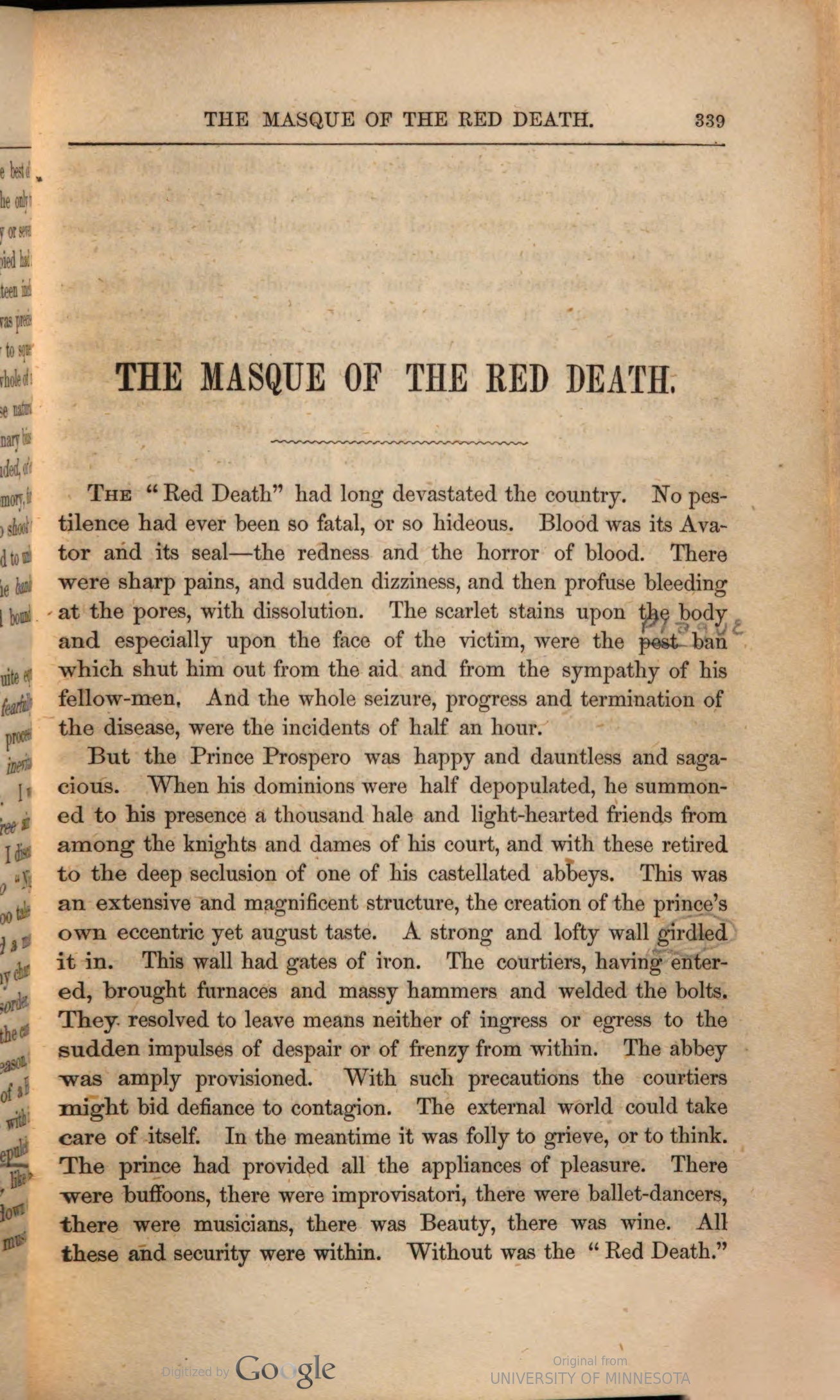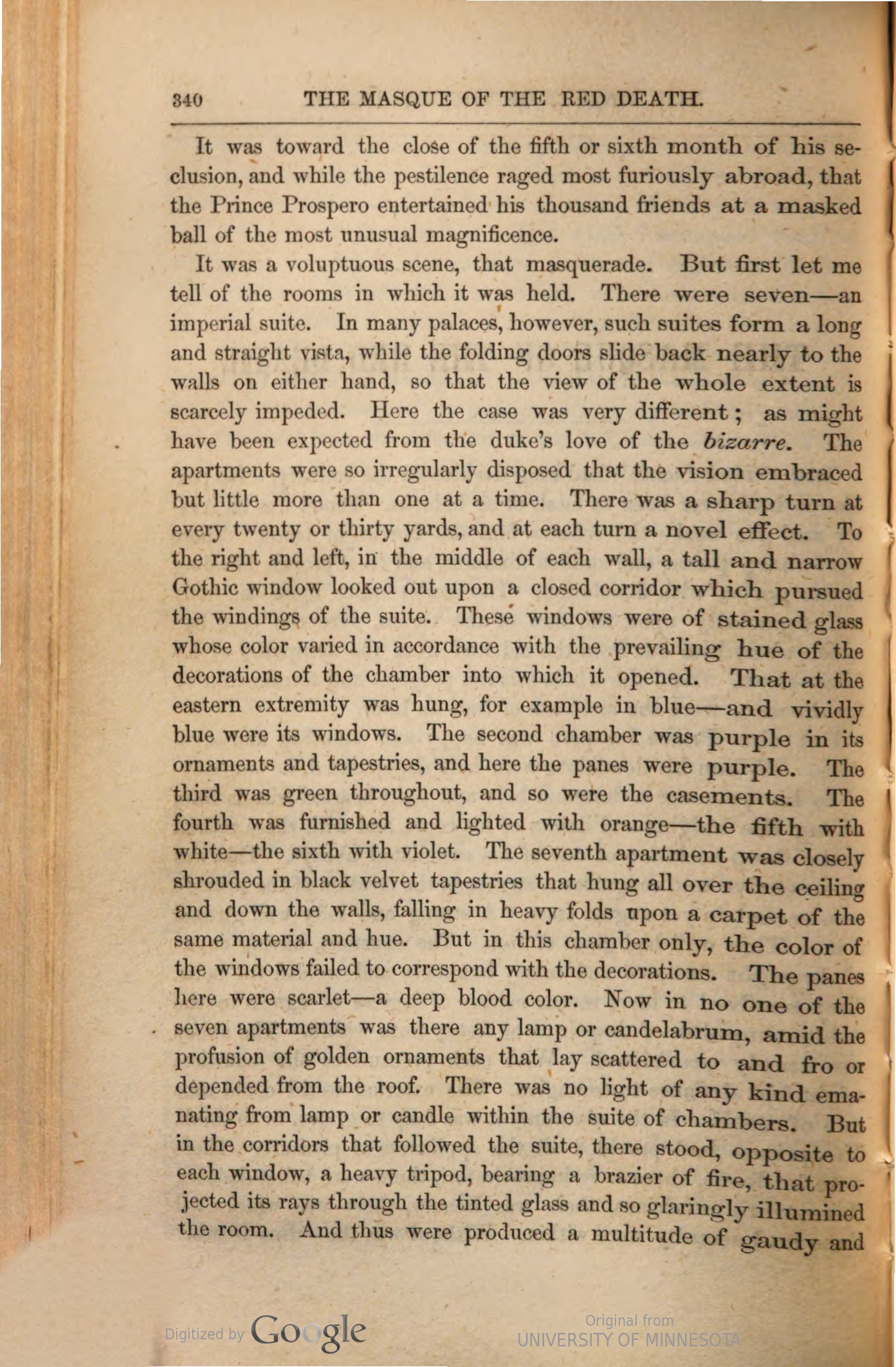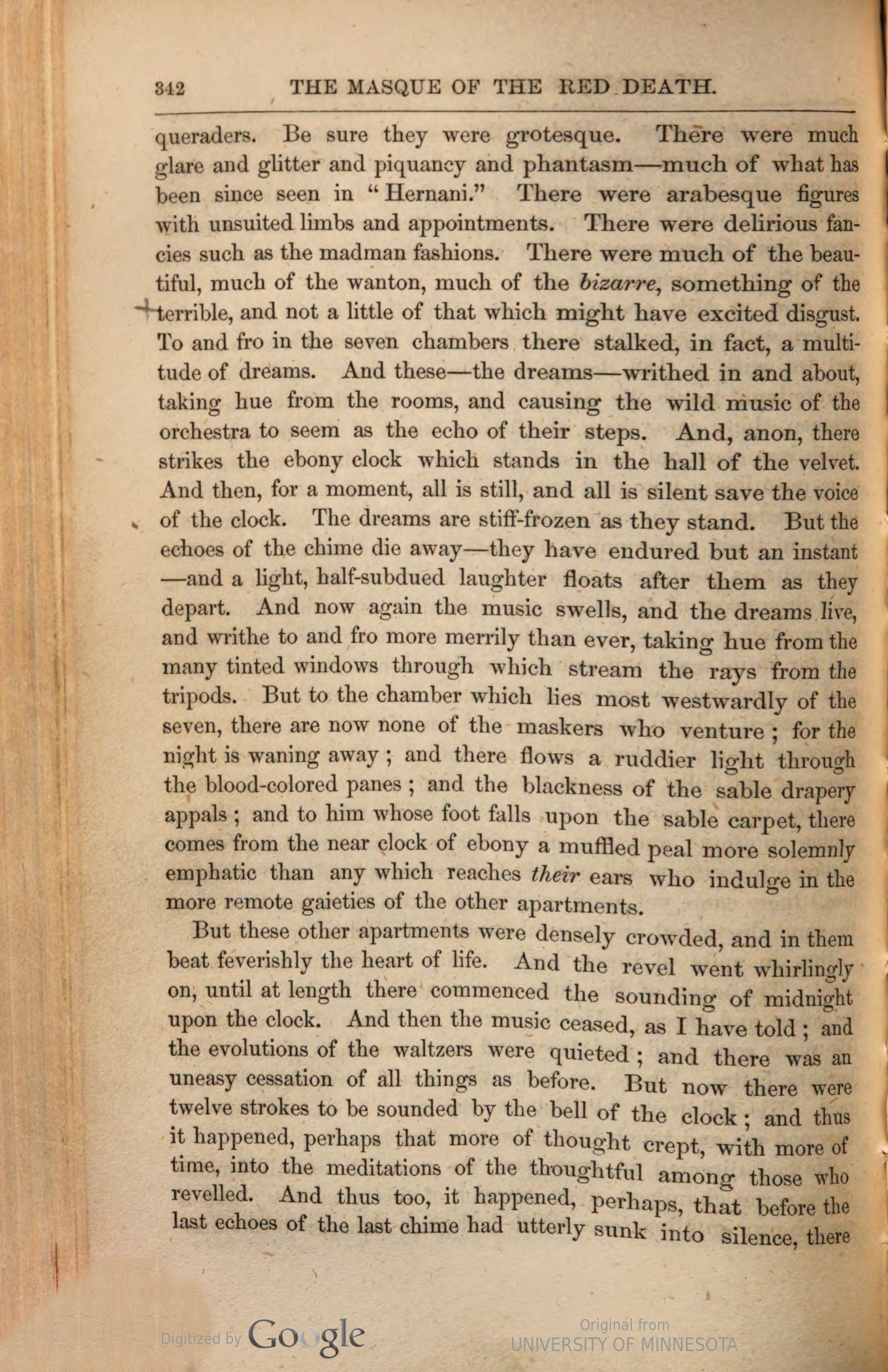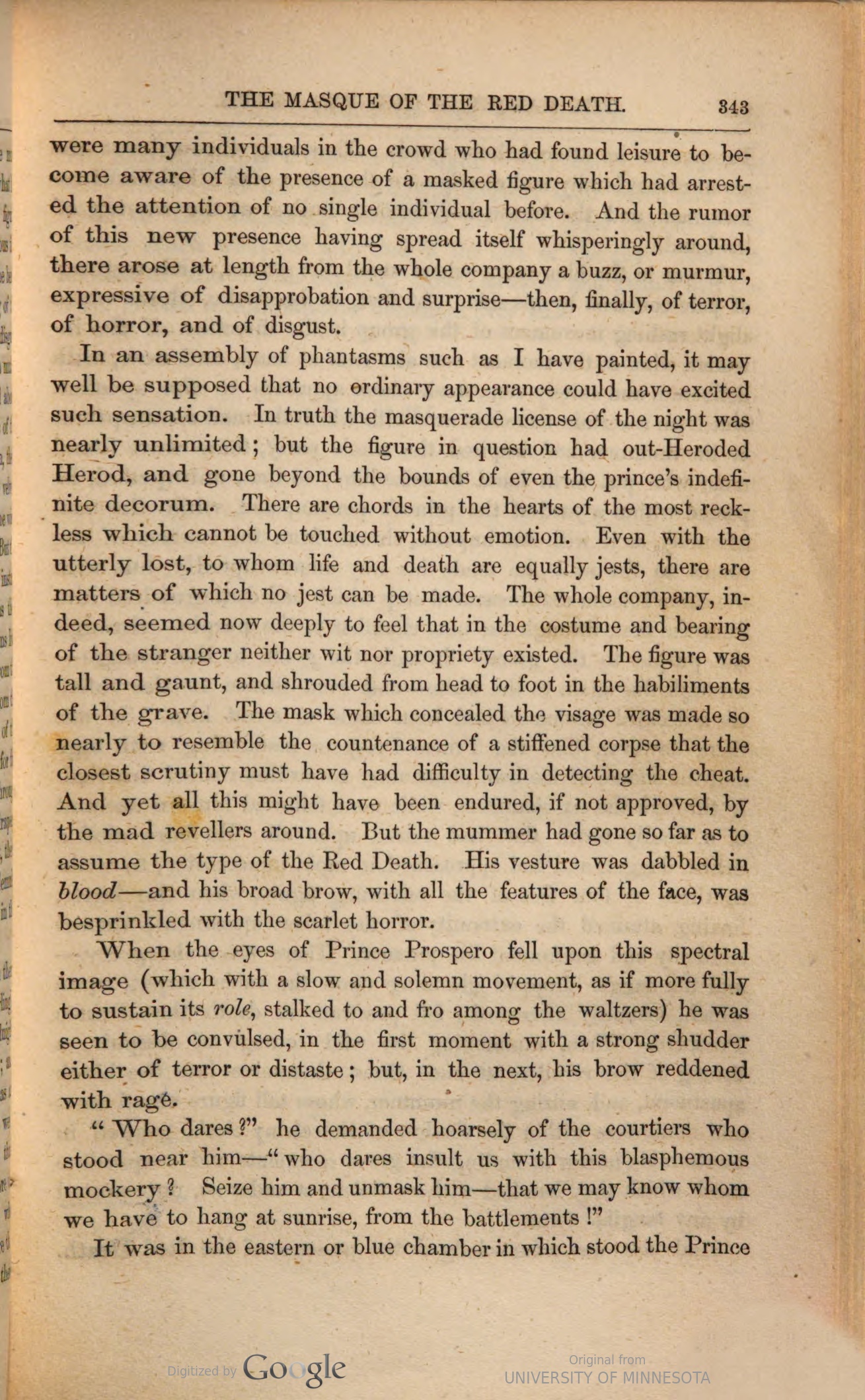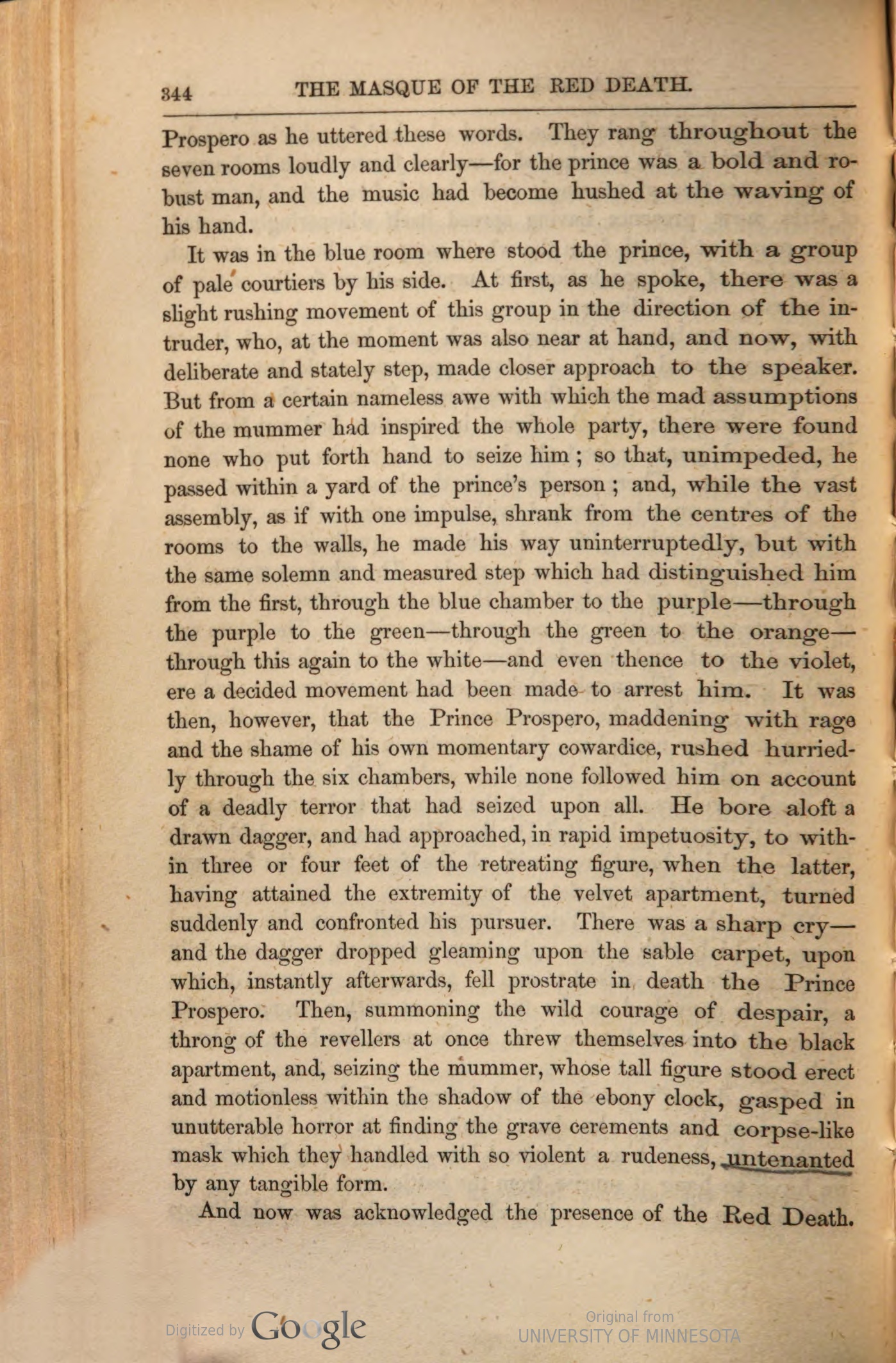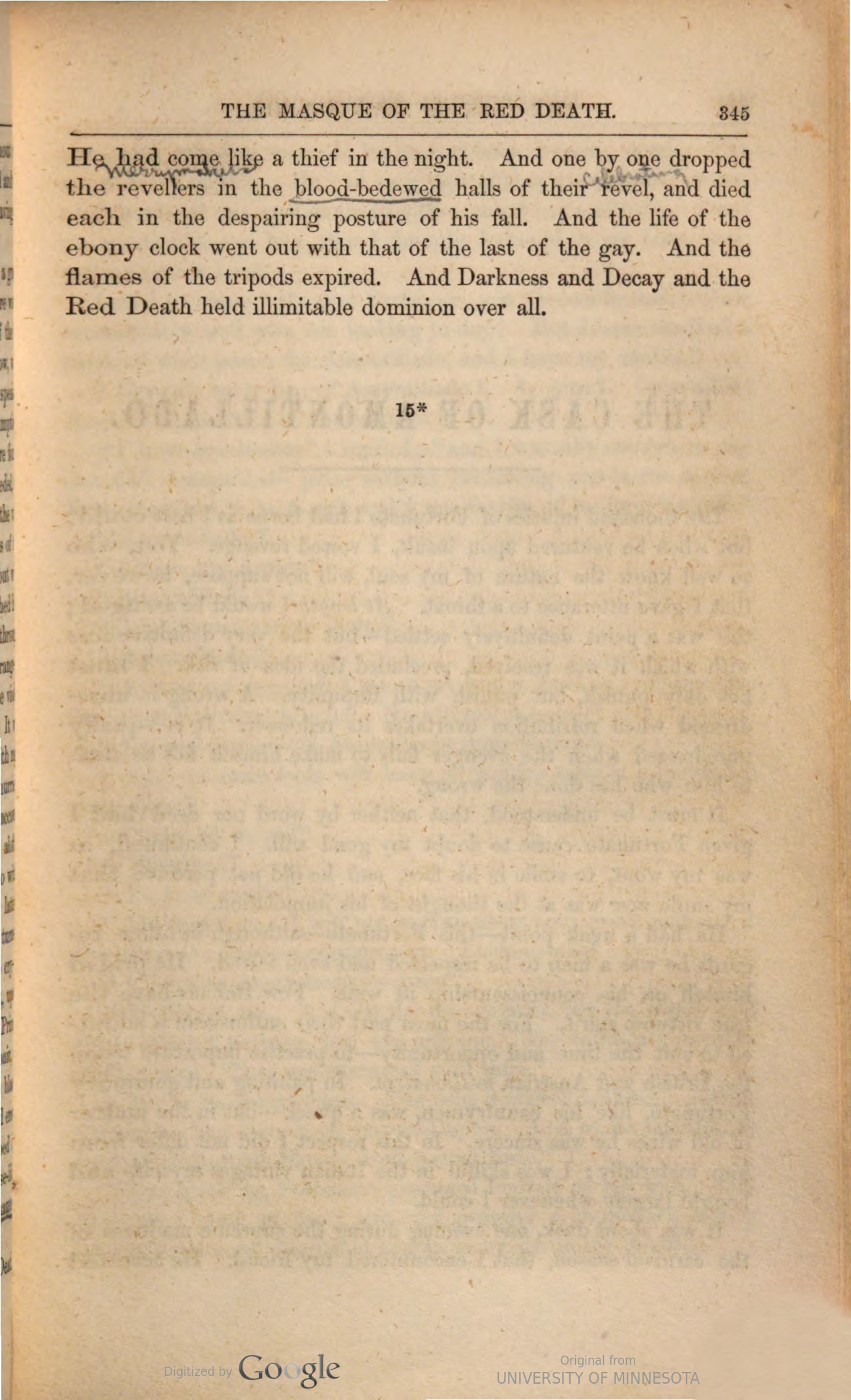"The Masque of the Red Death"
By
Edgar Allan Poe
Transcription, correction, editorial commentary, and markup by Students and Staff of The University of
Virginia
masqueThis
story was first published in Graham's Magazine, a journal
published in Philadelphia, in May 1842, under the title "The Mask of the Red
Death: A Fantasy." Poe was editor of the magazine from February 1841 to April
1842; the story was probably at the printers' at the time he departed. (No one
knows for certain why he left the mgazine, but most accounts suggest that he did
so impulsively.) The story was republished in the Broadway
Magazine in July 1845 when Poe was editing that
magazine as "The Masque of the Red Death"; Poe had a habit of recycling stories,
and in an era without copyright protection, there was nothing to stop him. "The
Masque of the Red Death" is the title under which the story has become known, but
the original title is still relevant, and Poe probably intends a play on words,
with the word invoking both "masque" in the sense of an aristocratic spectacle or
entertainment, and "mask" in the sense of the mask that the partygoers, including
the character of the Red Death, are wearing.
Poe's modern editor T. O. Mabbott suggests that the story of an aristocrat having
a party in the midst of a plague probably comes from stories about such incidents
that occurred during a cholera epidemic in Paris in 1832. Nathaniel Willis
published an account of "a masque ball" in New York Mirror
that he attended that year in the midst of the outbreak that seems to resemble the
scenario of Poe's story closely: "There were some two thousand people, I should
think, in fancy dresses, most of them grotesque and satirical, and the ball was
kept up till seven in the morning, with all the extravagant gayety, noise, and
fun, with which the French people manage such matters. There was a cholera-waltzm and a cholera-galopade, and one man, immensely tall, dresed as a personification
of the Cholera itself, with skeleton armor, bloodshot eyes,
and other horrible appurtances of a walking pestilence." [Nathaniel P. Willis, Pencillings by the Way, in The Prose Works
of N. P. Willis, Philadelphia, 1854, p. 24.] Willis, perhaps the most
famous journalist of the period, was so well known to American readers, and so
close a friend of Poe's at this time, that it seems very likely that Poe read his
account of rich people partying in the midst of an epidemic. "The Masque of the
Red Death" has remained one of Poe's most popular short stories.
- [JOB]pestban
"Pest Ban" refers to the sign by which an individual could be incontrovertibly
diagnosed with the plague.
- [AJB]prosperoProspero is, of course, the name of the central character in William
Shakespeare's 1611 play The Tempest.
- [JOB]improvisatoriA group of Italian poets who were known for their ability
to improvise songs on the spot. They may go back as far as the fourteenth century;
by the middle of the nineteenth century, when Poe was writing, they were
disappearing.
- [JOB]gothicA
stone arched window, such as one in what we now call a "Gothic" cathedral.
- [JOB]decora
'Decora' is the Latin term for 'customs'.
- [AJB]fete
'Fête' is the French term for 'party'.
- [AJB]hernaniHernani, or l"Honneur Castilian is a play by Victor Hugo,
first staged in 1830 in Paris. Set in the sixteenth-century Spanish court, the
play had a copmlicated and violent plot.
- [JOB]arabesque"Arabesque" in this context means only vaguely Islamic or Arab in style.
- [JOB]herodIn the
New Testament, Herod is the King of Israel at the time of the birth of Jesus. In
the Gospel of Matthew, he is responsible for the massacre of the innocents, where
he was said to have murdered all boys under the age of two when he heard of the
birth of a king who would someday rival him. The phrase "out-Herod Herod" comes
from Shakespeare's Hamlet.
- [JOB]mummerA
masked dancer in a traditional English dance, here probably being used more
generally to describe a masked performer.
- [JOB]cerement
Waxed wrappings for the dead; or, generally, grave-clothes. Source: Oxford English
Dictionary.
- [AJB]
[TP]
THE WORKS
OF THE LATE
EDGAR ALLAN POE
WITH
NOTICES OF HIS LIFE AND GENIUS.
IN TWO VOLUMES.
VOL. I.
TALES.
NEW YORK:
J. S. REDFIELD, CLINTON HALL.
1850.
OF THE LATE
EDGAR ALLAN POE
WITH
NOTICES OF HIS LIFE AND GENIUS.
IN TWO VOLUMES.
VOL. I.
TALES.
NEW YORK:
J. S. REDFIELD, CLINTON HALL.
1850.
Footnotes
masque_This
story was first published in Graham's Magazine, a journal
published in Philadelphia, in May 1842, under the title "The Mask of the Red
Death: A Fantasy." Poe was editor of the magazine from February 1841 to April
1842; the story was probably at the printers' at the time he departed. (No one
knows for certain why he left the mgazine, but most accounts suggest that he did
so impulsively.) The story was republished in the Broadway
Magazine in July 1845 when Poe was editing that
magazine as "The Masque of the Red Death"; Poe had a habit of recycling stories,
and in an era without copyright protection, there was nothing to stop him. "The
Masque of the Red Death" is the title under which the story has become known, but
the original title is still relevant, and Poe probably intends a play on words,
with the word invoking both "masque" in the sense of an aristocratic spectacle or
entertainment, and "mask" in the sense of the mask that the partygoers, including
the character of the Red Death, are wearing.
Poe's modern editor T. O. Mabbott suggests that the story of an aristocrat having
a party in the midst of a plague probably comes from stories about such incidents
that occurred during a cholera epidemic in Paris in 1832. Nathaniel Willis
published an account of "a masque ball" in New York Mirror
that he attended that year in the midst of the outbreak that seems to resemble the
scenario of Poe's story closely: "There were some two thousand people, I should
think, in fancy dresses, most of them grotesque and satirical, and the ball was
kept up till seven in the morning, with all the extravagant gayety, noise, and
fun, with which the French people manage such matters. There was a cholera-waltzm and a cholera-galopade, and one man, immensely tall, dresed as a personification
of the Cholera itself, with skeleton armor, bloodshot eyes,
and other horrible appurtances of a walking pestilence." [Nathaniel P. Willis, Pencillings by the Way, in The Prose Works
of N. P. Willis, Philadelphia, 1854, p. 24.] Willis, perhaps the most
famous journalist of the period, was so well known to American readers, and so
close a friend of Poe's at this time, that it seems very likely that Poe read his
account of rich people partying in the midst of an epidemic. "The Masque of the
Red Death" has remained one of Poe's most popular short stories.
pestban_
"Pest Ban" refers to the sign by which an individual could be incontrovertibly
diagnosed with the plague.
prospero_Prospero is, of course, the name of the central character in William
Shakespeare's 1611 play The Tempest.
improvisatori_A group of Italian poets who were known for their ability
to improvise songs on the spot. They may go back as far as the fourteenth century;
by the middle of the nineteenth century, when Poe was writing, they were
disappearing.
gothic_A
stone arched window, such as one in what we now call a "Gothic" cathedral.
decora_
'Decora' is the Latin term for 'customs'.
fete_
'Fête' is the French term for 'party'.
hernani_Hernani, or l"Honneur Castilian is a play by Victor Hugo,
first staged in 1830 in Paris. Set in the sixteenth-century Spanish court, the
play had a copmlicated and violent plot.
arabesque_"Arabesque" in this context means only vaguely Islamic or Arab in style.
herod_In the
New Testament, Herod is the King of Israel at the time of the birth of Jesus. In
the Gospel of Matthew, he is responsible for the massacre of the innocents, where
he was said to have murdered all boys under the age of two when he heard of the
birth of a king who would someday rival him. The phrase "out-Herod Herod" comes
from Shakespeare's Hamlet.
mummer_A
masked dancer in a traditional English dance, here probably being used more
generally to describe a masked performer.
cerement_
Waxed wrappings for the dead; or, generally, grave-clothes. Source: Oxford English
Dictionary.
